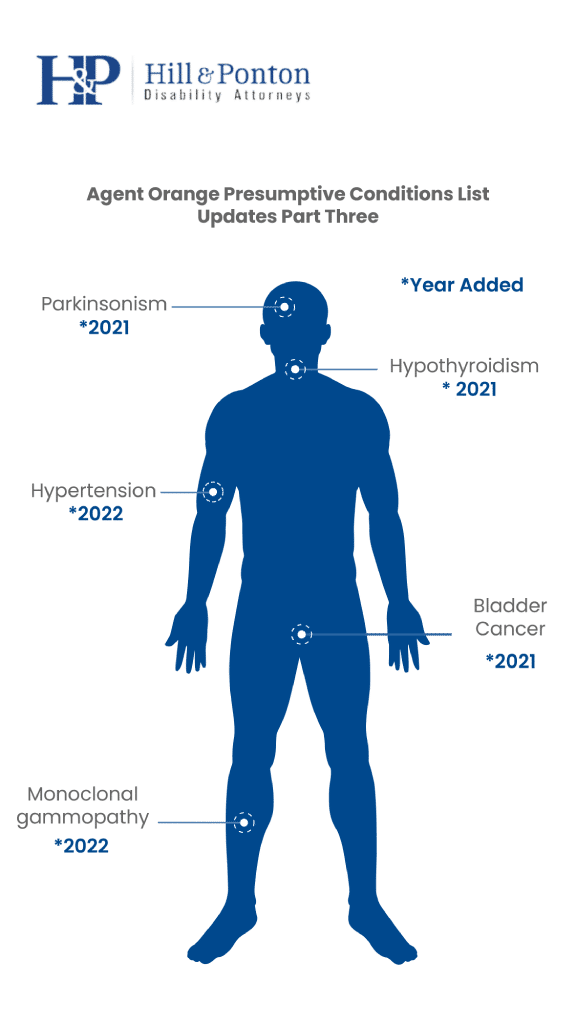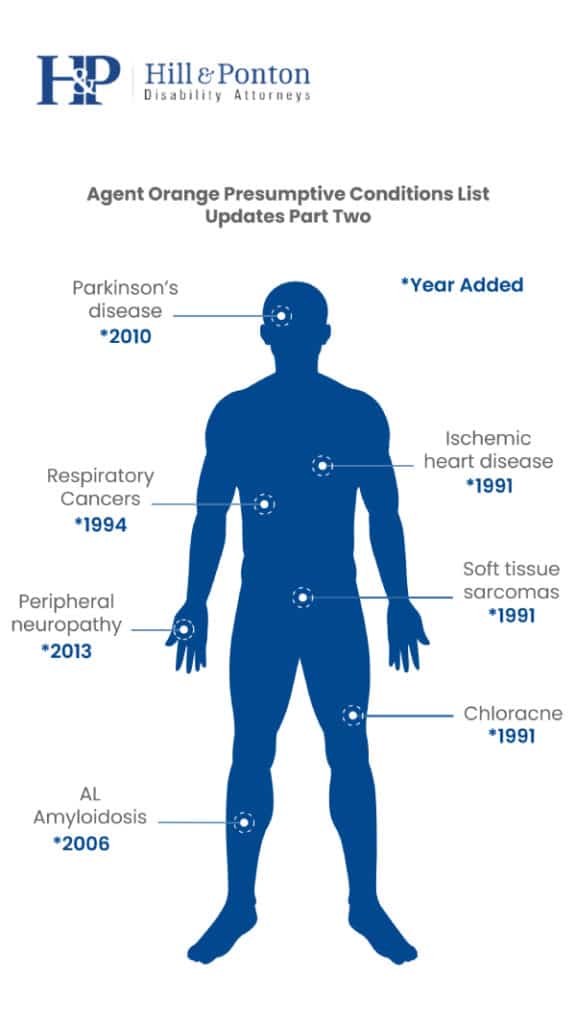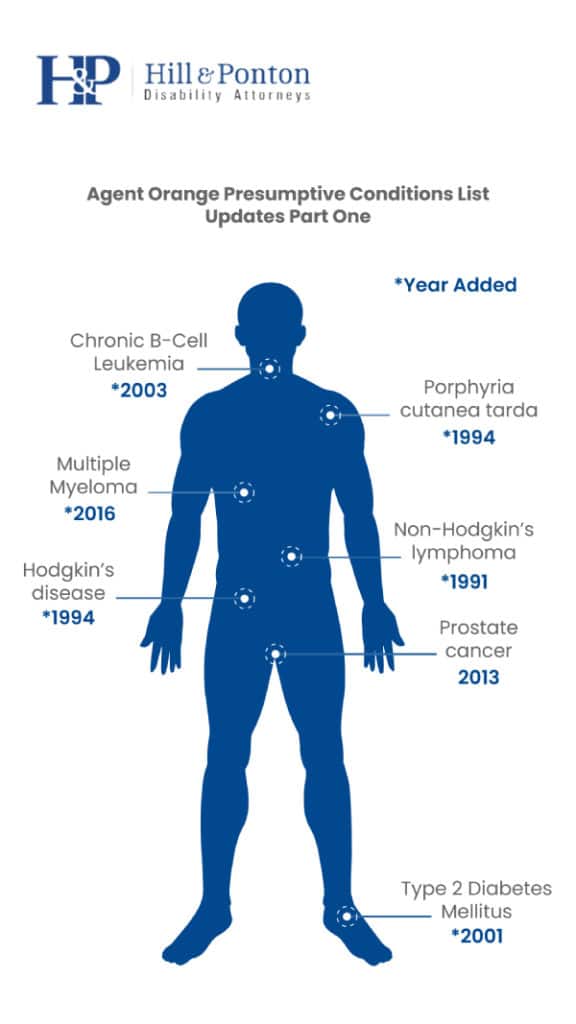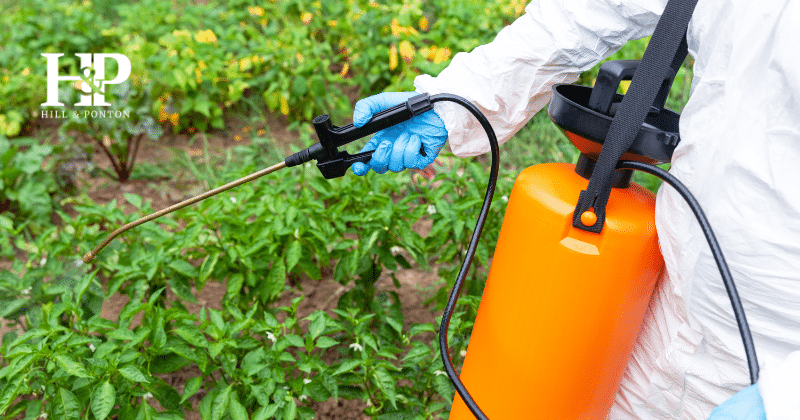Agent Orange, which was once used by the military in Vietnam, has left a lasting impact on the veteran community.
If you served during specific periods of time and in certain locations, you may have health issues recognized by the Veterans Administration (VA) that can be service-connected to this exposure.
This guide will focus on both the presumptive conditions linked to Agent Orange and secondary conditions, other issues that can arise as a result of Agent Orange exposure, that can be useful ways to both gain service-connection and secure a higher VA disability rating.
Understanding Agent Orange Presumptive Conditions
Presumptive Conditions, as defined by the VA, are those that they automatically presume they were caused by a veterans military service.
Typically these presumed conditions are awarded VA disability benefits without having to prove (provide a nexus) that their condition was caused by a service-related incident (i.e. Agent Orange).
The VA has recognized certain cancers and other health problems as presumptive diseases that could be associated with exposure to herbicides like Agent Orange and others during their time in service.
Veterans may be eligible for compensation, and surviving dependents, DIC benefits.
The VA’s list of Agent Orange Presumptive Conditions includes:
- AL Amyloidosis: a rare condition where amyloid proteins unwillingly enter the body tissues and organs.
- Bladder Cancer: a type of cancer impacting the bladder and surrounding areas that are important in removing urine from the body.
- Chronic B-cell Leukemia: A type of white blood cell cancer that includes all B-cell leukemias and hairy-cell leukemias and chronic lymphocytic leukemia.
- Chloracne: A type of skin condition that occurs shortly after exposure to certain chemicals and resembles acne. The VA requires it must be at least 10% disabling within one year of exposure to the chemical.
- Diabetes Mellitus Type 2: When there is high blood sugar levels within the body and an inability to appropriately respond to the insulin hormone.
- Hypertension: High blood pressure
- Hodgkin’s Disease: A type of lymphoma that is malignant (cancerous) and is characterized by enlargement of lymph nodes, liver and spleen.
- Hypothyroidism: A condition of the thyroid gland that prevents it from producing certain types of hormones.
- Ischemic Heart Disease: A disease that occurs when the blood supply to the heart is decreased and will lead to chest pain.
- Monoclonal gammopathy of undetermined significance (MGUS)
- Multiple Myeloma: A white-blood cell cancer that impacts plasma cells specifically, that reside in bone marrow.
- Non-Hodgkin’s Lymphoma: A variety of cancers that will impact various parts of the lymphatic system, like tissue and lymph nodes/glands.
- Parkinsonism: Any condition that results in the body moving abnormally (muscle tremors, stiff muscles, speech issues, slow/irregular movements).
- Parkinson’s Disease: A progressive disease that impacts the central nervous system (CNS) and an individual’s muscle movements.
- Peripheral Neuropathy, Early-Onset: A nervous system condition that often results in weakness, numbness or tingling in various extremities. The VA states that this must be at least 10% disabling within one year of exposure to an herbicide.
- Porphyria Cutanea Tarda: A disorder that causes dysfunction of the liver and surrounding tissue and thinning/blistering of the skin. The VA requires this disease must be 10% disabling within one year of being exposed to an herbicide.
- Prostate Cancer: One of the most common cancers in men, impacting the prostate.
- Respiratory Cancers: Any cancer that impacts the lungs, larynx, trachea or bronchus.
- Soft Tissue Sarcomas: Types of cancers that impact body tissues like muscle, fat, blood and lymph vessels. Note: the VA excludes osteosarcoma, chondrosarcoma, Kaposi’s sarcoma and mesothelioma from this list.



Who is eligible for Agent Orange benefits?
To be eligible for VA disability benefits for a presumptive condition related to Agent Orange exposure, veterans must meet certain criteria requirements.
One of the following must be true:
- You served in Vietnam between January 9, 1962, and May 7, 1975.
- You were stationed near the Korean DMZ from September 1, 1967, to August 31, 1971.
- You were aboard U.S. military vessels in Vietnam’s inland waterways or coastal areas.
- Under the Honoring Our PACT Act, eligibility has expanded to include additional locations like Thailand and Guam during certain periods, or if you served in another location that stored or tested herbicides.
Find out if you were aboard a U.S. military vessel that was exposed to Agent Orange by using our interactive Blue Water Navy Map below.
Click here to find out if your ship was exposed
What are Secondary Conditions to Agent Orange Related Conditions?
Secondary conditions are health issues that arise as a direct result of a primary service-connected condition–in this case, herbicide or Agent Orange related conditions.
Veterans often underestimate what a critical role these conditions can play in their VA disability claim.
When a veteran is able to secondary-connect more conditions to a primary condition that may be underrated initially, it can help bolster the rating and bring them a much more desirable outcome.
Basically, it can help take you from a decent 50% VA rating, for example, to a 100% VA rating, just by connecting certain conditions together.
Examples of Secondary Conditions to Agent Orange Related Conditions
- Heart Disease Secondary to Hyperthyroidism
- Depression Secondary to Cancer
- Sleep Apnea Secondary to Parkinson’s Disease
- Kidney Failure secondary to Multiple Myeloma
- Peripheral Neuropathy Secondary to Diabetes Mellitus Type II
This list is only a handful of examples that have been seen with veterans in previous cases, but it’s important to note that there are many potential health issues that can connect secondary to an Agent Orange presumptive condition.
How to File for Secondary Conditions for a Higher VA Rating
While we talk about secondary service connection in greater detail in our guide, you should understand a few key steps to keep in mind when applying for secondary conditions to your disability caused by Agent Orange exposure.
Here’s a brief list:
- Identify the Connection: Make sure it’s clear how your primary service-connected condition has caused or worsened other health issues you are trying to claim as secondary conditions.
- Collect Medical and Other Evidence: Gather medical records, doctor’s statements, treatment documentation, lay statements, buddy statements and any other evidence to help bolster your claim and prove your secondary condition connection.
- File Your Claim: File a claim for VA disability benefits through the VA’s website or with the assistance of a VA-accredited attorney or agent. If you have previously applied for benefits and are appealing, you can consider hiring legal representation if necessary to assist with connecting your secondary conditions.
Why do secondary conditions matter so much?
Claiming secondary conditions is not just about recognizing the broader impact of your service-connected disability.
It’s also ensuring that your compensation reflects the true extent of your health issues related to Agent Orange exposure.
It’s essential in helping to maximize your benefits and acknowledge the extent your conditions impact your day-to-day life.
It’s important to explore any considerations you may have and connect with an expert, like a Veteran Service Organization (VSO) or another legal representative, to assist you.
Were You Denied Benefits?
Your Time is as Important as Your Claim
Your moments are precious.
Don’t waste them on legal complexities trying to fight an appeal.
Get your free case evaluation with us today.
Additional Benefits and Considerations for Agent Orange Exposure
Remember, when considering benefits for your Agent Orange claims, it’s important to consider other options of compensation that may be available to you and your dependents.
A few considerations to keep in mind:
- Special Monthly Compensation (SMC): This is a tax-free benefit offered in addition to VA disability benefits to veterans who, as a result of service, incurred extreme medical circumstances or the loss or loss of use of certain specific organs or extremities. If your service-connected condition has led to a need for aid & attendance (A&A) or requires significant day-to-day assistance, you may be eligible for SMC.
- Total Disability Individual Unemployability (TDIU): TDIU offers VA benefits at the 100% disability rate, even if your rating is less, provided your service-connected conditions prevent you from maintaining substantially gainful employment.
- Benefits for Dependents and Survivors: There are a variety of VA benefits for dependents of veterans, including Dependency and Indemnity Compensation (DIC), Educational Assistance and others. Additionally, children who were born to veterans exposed to Agent Orange may have an increased risk of birth defects. The VA provides additional benefits to these children, acknowledging these hereditary impacts of the herbicide exposure.
Content Review
Cassandra Crosby, an Accredited Agent and claims advocate for Matthew Hill & Shelly Mark’s teams, reviewed the information provided in this post.







